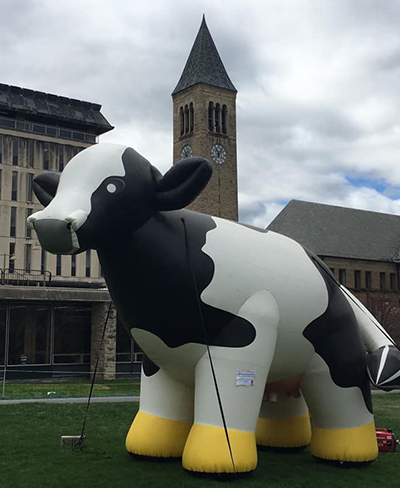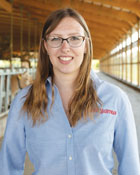
Each year that I’ve been an undergraduate student at Cornell, my Sigma Alpha chapter has put on an event that we like to call “The Art of Agriculture.” Our campus has a unique climate, with a world-renowned agriculture program and a liberal arts school full of people who have never seen a cow up close. Because of this dynamic, we take a day each spring to bring agriculture to the Arts Quad. We set up a 20-foot-tall blown-up cow that we borrow from the New York Animal Agriculture Coalition, give out free burgers and hotdogs, and talk to people about agriculture as they pass by on their way to class.
This year, due to the health restrictions on campus, we were unable to hold our event as we normally would. We were forced to adapt and think about other ways that agriculture is an art. There was another age group of students who came to mind who might be interested in learning more about how agriculture can apply to a variety of careers — high schoolers.
I remember being a high school student who grew up in agriculture but struggled to be proud of my background. The disconnect between the kids who thought of farming as a low-grade occupation and the ones who were knee-deep in it was huge. Even some teachers would make off-handed comments about it, saying things like “Agriculture today is very industrial, which means that pretty much anyone can do it. It’s not a very difficult job,” without fully realizing what they were saying, or who they were saying it to.
That’s a big part of why we put this program on. My co-chair had experienced similar things, and honestly, almost every person I’ve met at college who’s interested in agriculture received similar backhanded comments in middle and high school about their interests not just from their peers, but from their teachers and guidance counselors, too.
The art of an agricultural education is this:
- A diverse skillset: Working and learning about agriculture teaches you about science, technology, sustainability, innovation, and hard work, and it gives you an appreciation for people, animals, land, and so much more.
- Networking: Time and time again I am told that one of the best things about working in ag is the people. This industry was built in and around families and their businesses, and even if you aren’t directly related to anyone in the business, you’ll be treated like family, and you’ll gain a network of people who are intelligent and hardworking.
- Job security: Everyone needs to eat, every day. Whether that consists of plants or animals, it is grown, harvested, and marketed by somebody.
- Job diversity: Whether you want to be a scientist, a researcher, a communicator, a marketer, or anything else, there’s a place for you in agriculture. We are science-based and always growing.
- You make a difference: Agriculture is conservation. Agriculture is feeding the hungry. In this industry, we are at the forefront of some of the most pressing issues in the world. We can be a part of the climate change solution, and we can do it while feeding the population.
You don’t have to have a job in the industry to take value away from an agriculture education, either. The skills gained by learning and working in agriculture will provide you with a strong foundation for any career. While we didn’t put on the event we have in the past, we adapted and found a new way to support students in agriculture. I am proud to be an agvocate and proud to have grown up in the industry. I hope that this blog instills a little bit of that pride in each person who reads it and that we can continue to spread the word about the art of agriculture.









